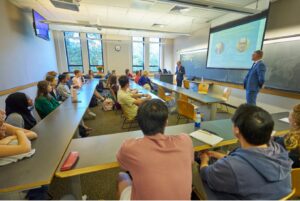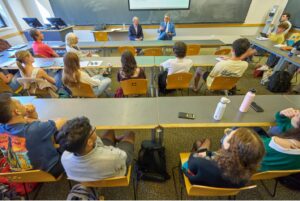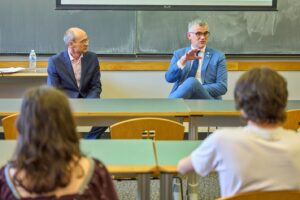Estonian Ambassador Kristjan Prikk discusses Russia-Ukraine conflict and European democracy with Vanderbilt students
Article written by Alexander Schmidt, Visiting Associate Professor of Max Kade Center for European and German Studies, and Allison Kaplan, class of 2025
 Estonia’s Ambassador to the United States, Kristjan Prikk, engaged students at Vanderbilt University on October 2 during a lively classroom discussion on the future of European security and democracy. The event, hosted by the Max Kade Center for European and German Studies, was part of Visiting Associate Professor Alexander Schmidt’s European Cultural History course.
Estonia’s Ambassador to the United States, Kristjan Prikk, engaged students at Vanderbilt University on October 2 during a lively classroom discussion on the future of European security and democracy. The event, hosted by the Max Kade Center for European and German Studies, was part of Visiting Associate Professor Alexander Schmidt’s European Cultural History course.
Meike Werner, Centennial Chair in European and German Studies and director of the Max Kade Center, introduced the ambassador. Schmidt, who organized the event, led the discussion with the ambassador and moderated the students’ questions.
“The idea for this event goes back over a year,” said Schmidt, who first met Ambassador Prikk at the second Vanderbilt Summit on Modern Conflict and Emerging Threats in May 2023. “We’re truly grateful that Ambassador Prikk accepted our invitation. His background as a career diplomat and national security expert offers students an unparalleled first-hand perspective on some of the most critical issues in European politics and transatlantic relations.”
Many students echoed these sentiments. Allison Kaplan, a senior writing her Honors thesis in European studies, appreciated the classroom setting, noting it allowed ample opportunity for questions. Caroline Empey, a junior studying public policy and business, added, “The ambassador’s visit was a valuable chance to gain exposure to different global perspectives.”
 Joey Xie, a pre-med student, found the personal histories of Schmidt, who grew up in East Germany, and Ambassador Prikk, who lived under Soviet rule, especially compelling. “Their shared experiences shaped a rich discussion about Europe’s political and social challenges, adding depth to what could have been just a policy talk.”
Joey Xie, a pre-med student, found the personal histories of Schmidt, who grew up in East Germany, and Ambassador Prikk, who lived under Soviet rule, especially compelling. “Their shared experiences shaped a rich discussion about Europe’s political and social challenges, adding depth to what could have been just a policy talk.”
Schmidt highlighted the often-overlooked importance of Estonia and other Eastern European states in public and academic discourse. Estonia’s journey, from regaining independence from Soviet occupation in 1991 to becoming a member of the European Union and NATO in 2004, illustrates its pivotal role in the region. “For Estonians,” Prikk remarked, “EU membership meant reconnecting with our European cultural and economic ties that stretch back to the Middle Ages.” Estonia has thrived as an EU member, transforming into a digital powerhouse and seeing a significant growth in GDP in the first decade after joining.
Ambassador Prikk also touched on Estonia’s innovative approach to digital services, highlighting how citizens can vote, pay taxes, and access government services online—a system only excluding marriage and divorce.
The conversation took a serious turn when Prikk addressed the ongoing Russian invasion of Ukraine. Estonia, sharing a border with Russia, has been a frontline supporter of Ukraine, committing significant military and humanitarian aid. Prikk advocated for a firm stance in dealing with Russia, emphasizing that seeking compromise with the Putin regime would yield little.
Prikk concluded by encouraging students to be curious and open to global perspectives, urging them to embrace those who may be quieter voices in the conversation, noting that sometimes the key to success lies in listening to those who speak less. “Every person is beautiful and useful,” he said, closing the conversation with a call for unity and understanding in an increasingly complex world.
While on campus, the ambassador also met with leadership from the Vanderbilt Institute of National Security and the university’s Division of Government and Community Relations. These meetings underscored the importance of academic collaboration and diplomacy in addressing pressing global security concerns.
